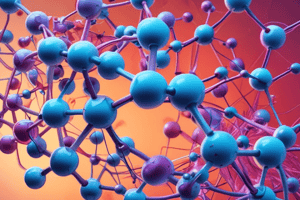Podcast
Questions and Answers
जैविक रसायन विज्ञान में अध्ययन की जाने वाली प्रमुख वस्तुओं में से एक क्या है?
जैविक रसायन विज्ञान में अध्ययन की जाने वाली प्रमुख वस्तुओं में से एक क्या है?
हाइड्रोकार्बन, अल्कोहल, कार्बोक्सिलिक अम्ल और अमिन
कार्बनिक यौगिकों में किस प्रकार की बंध उत्पन्न होती है?
कार्बनिक यौगिकों में किस प्रकार की बंध उत्पन्न होती है?
सहसंयोजक बंध
अजैविक रसायन विज्ञान में अध्ययन किए जाने वाले प्रमुख विषय क्या हैं?
अजैविक रसायन विज्ञान में अध्ययन किए जाने वाले प्रमुख विषय क्या हैं?
आयनिक संयोजन, अम्ल-क्षार रासायनिकी और समन्वय रासायनिकी
जैविक रसायन विज्ञान में प्रयुक्त एक प्रमुख संकल्पना क्या है?
जैविक रसायन विज्ञान में प्रयुक्त एक प्रमुख संकल्पना क्या है?
अजैविक रसायन विज्ञान में अध्ययन किए जाने वाले प्रमुख यौगिक क्या हैं?
अजैविक रसायन विज्ञान में अध्ययन किए जाने वाले प्रमुख यौगिक क्या हैं?
जैविक रसायन विज्ञान का एक प्रमुख अनुप्रयोग क्या है?
जैविक रसायन विज्ञान का एक प्रमुख अनुप्रयोग क्या है?
अजैविक रसायन विज्ञान में आयनिक संयोजन क्या है?
अजैविक रसायन विज्ञान में आयनिक संयोजन क्या है?
जैविक रसायन विज्ञान में प्रयुक्त एक प्रमुख संकल्पना क्या है?
जैविक रसायन विज्ञान में प्रयुक्त एक प्रमुख संकल्पना क्या है?
अजैविक रसायन विज्ञान का एक प्रमुख अनुप्रयोग क्या है?
अजैविक रसायन विज्ञान का एक प्रमुख अनुप्रयोग क्या है?
Flashcards are hidden until you start studying
Study Notes
Organic Chemistry
- Deals with the study of carbon-containing compounds and their properties
- Includes the study of hydrocarbons, functional groups, and biomolecules
- Key concepts:
- Isomerism: existence of multiple compounds with the same molecular formula but different structures
- Functional groups: specific groups of atoms that determine the chemical properties of a molecule
- Reaction mechanisms: step-by-step descriptions of how chemical reactions occur
- Important types of organic compounds:
- Hydrocarbons: compounds containing only carbon and hydrogen atoms
- Alcohols: compounds containing a hydroxyl (-OH) functional group
- Carboxylic acids: compounds containing a carboxyl (-COOH) functional group
- Amines: compounds containing an amino (-NH2) functional group
- Applications:
- Pharmaceuticals: development of new medicines and drugs
- Polymers: creation of synthetic materials such as plastics and fibers
- Biofuels: development of alternative energy sources from organic matter
Inorganic Chemistry
- Deals with the study of non-carbon-containing compounds and their properties
- Includes the study of minerals, salts, and acids
- Key concepts:
- Ionic bonding: formation of bonds between atoms with a large difference in electronegativity
- Acid-base chemistry: study of the properties and reactions of acids and bases
- Coordination chemistry: study of complexes formed between central metal atoms and surrounding ligands
- Important types of inorganic compounds:
- Oxides: compounds containing oxygen and another element
- Halides: compounds containing a halogen (F, Cl, Br, I) and another element
- Acids: compounds that donate a proton (H+ ion)
- Salts: compounds formed from the reaction of an acid and a base
- Applications:
- Materials science: development of new materials with unique properties
- Catalysis: development of substances that speed up chemical reactions
- Environmental science: study of the chemistry of natural systems and the impact of human activities on the environment
ऑर्गेनिक रसायन विज्ञान
- कार्बन-संहтот धातुओं के गुणों का अध्ययन कर्ता है
- हाइड्रोकार्बन, फंक्शनल समूह, और जैव अणुओं का अध्ययन करता है
- प्रमुख अवधारणाएं:
- आइसोमरिज्म: एक ही आणविक सूत्र के साथ विभिन्न संरचनाओं वाले कई यौगिकों की उपस्थिति
- फंक्शनल समूह: किसी यौगिक के रासायनिक गुणों को निर्धारित करने वाले विशिष्ट परमाणु समूह
- प्रतिक्रिया तंत्र: रासायनिक प्रतिक्रियाओं के चरण-दर-चरण वर्णन
- प्रमुख ऑर्गेनिक यौगिक प्रकार:
- हाइड्रोकार्बन: केवल कार्बन और हाइड्रोजन परमाणुओं वाले यौगिक
- अल्कोहल: हाइड्रॉक्सिल (-OH) फंक्शनल समूह वाले यौगिक
- कार्बोक्सिलिक अम्ल: कार्बोक्सिल (-COOH) फंक्शनल समूह वाले यौगिक
- अमाइन: अमीनो (-NH2) फंक्शनल समूह वाले यौगिक
- अनुप्रयोग:
- फार्मास्यूटिकल्स: नई दवाओं और दवाओं का विकास
- पॉलिमर: सिंथेटिक सामग्रियों, प्लास्टिक और फाइबर्स का निर्माण
- बायोफ्यूल: जैव सामग्री से वैकल्पिक ऊर्जा स्रोतों का विकास
इनऑर्गेनिक रसायन विज्ञान
- कार्बन-सह-युक्त यौगिकों के गुणों के अलावा सभी यौगिकों के अध्ययन कर्ता है
- खनिजों, नमकों, और अम्लों का अध्ययन करता है
- प्रमुख अवधारणाएं:
- आयनिक बंध: महत्वपूर्ण विद्युत नकारात्मकता अंतर वाले परमाणुओं के बीच बंधों का गठन
- अम्ल-आधार रसायन विज्ञान: अम्लों और आधारों के गुण और प्रतिक्रियाओं का अध्ययन
- समन्वय रसायन विज्ञान: केंद्रीय धातु परमाणुओं और संलग्न लिगेंडों के बीच комплексेस का अध्ययन
- प्रमुख इनऑर्गेनिक यौगिक प्रकार:
- ऑक्साइड्स: ऑक्सीजन और दूसरे तत्व वाले यौगिक
- हैलाइड्स: हैलोजन (एफ, सीएल, बीआर, आई) और दूसरे तत्व वाले यौगिक
- अम्ल: प्रोटोन (एच + आयन) दान करने वाले यौगिक
- नमक: अम्ल और आधार की प्रतिक्रिया से बनने वाले यौगिक
- अनुप्रयोग:
- सामग्री विज्ञान: नई सामग्री के साथ विशिष्ट गुणों का विकास
- कैटालिसिस: रासायनिक प्रतिक्रियाओं की गति बढ़ाने वाले पदार्थों का विकास
- पर्यावरण विज्ञान: प्राकृतिक प्रणालियों और मानव गतिविधियों के प्रभाव के अध्ययन
Studying That Suits You
Use AI to generate personalized quizzes and flashcards to suit your learning preferences.




